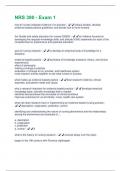NRS 390 - Exam 1
how do nurses integrate evidence in to practice - ✔️✔️critique studies, develop
evidence-based practice guidelines, and decide how to move forward
the Quality and safety education for nurses (QSEN) - ✔️✔️an initiative focused on
developing the requisite knowledge skills, and attitude (KSA) statements for each of the
competencies for prelicensure and graduate education
goal of nursing research - ✔️✔️to develop an empirical body of knowledge for a
discipline
evidence-based practice - ✔️✔️synthesis of knowledge (research, theory, and clinical
experiences)
effect of philosophy
making a change in practice
evaluation of change for pt, provider, and healthcare system
mold research articles together to see what is best for practice
what makes up evidence-based practice - ✔️✔️best research evidence, clinical
expertise, and patient needs and values
why is research important for evidence-based practice - ✔️✔️develops empirical
knowledge base: scientific knowledge that is needed
identifies best practices that are based on clinical practices
improves outcomes for: pt and family, nurse, health care system
what role does research have in implementing an evidence-based nursing practice -
✔️✔️description, explanation, prediction, control
identifying and understanding the nature of nursing phenomena and the relationships
among the phenomena are examples of....
a. description
b. explanation
c. prediction
d. control - ✔️✔️A
what is the history of nursing research - ✔️✔️evolved slowly over the years
began in the 19th century with Florence nightingale
,clinical research is the current major focus of nursing research and will continue to be
so throughout the 21st century
nursing research: 21st century - ✔️✔️2000 - healthy people 2010
2000 - biological research for nursing
2002 - joint commission revised policies to support evidence-based care
2004 - world views on evidence-based nursing
2010 - healthy people 2020
2005 - AHRQ guidelines and priorities
2005 - NINR priorities
2006 - Revised AACN position statements on nursing research
how is nurs what is nursing research - ✔️✔️to search again
to examine carefully
diligent and systematic inquiry
discovery
ing knowledge acquired? - ✔️✔️traditions: do it this way, always been done this way
authority: been here 30yrs, do it this way
borrowing: look at other disciplines
trial and error; personal experience; role modeling
intuition: have feeling about something; builds through experience and prior knowledge
reasoning: logical
sets safety standards
empirical knowledge - ✔️✔️gained by employing quantitative, qualitative, and
outcomes research
why use empirical knowledge - ✔️✔️essential for the delivery of high-quality, safe pt
and family nursing care
present a new intervention and showing pt and family that research has shown it works
the beginning nurse researcher would like to investigate credible resources for
implementing protocols in clinical practice. Which of the following would be considered
empirical sources of nursing knowledge?
,a. reasoning, authority, and tradition
b. quantitative, qualitative, and outcomes research
c. care maps and protocols
d. role modeling and trial and error - ✔️✔️b
categories of quantitative research - ✔️✔️descriptive, correlational, quasi-experimental,
experimental
philosophical origin: quantitative - ✔️✔️logical positivism
focus: quantitative - ✔️✔️concise, objective, reductionistic
reasoning: quantitative - ✔️✔️logistic, deductive
basis of knowing: quantitative - ✔️✔️cause and effect relationships
theoretical focus: quantitative - ✔️✔️tests theory
categories of qualitative research - ✔️✔️phenomenological, grounded theory,
ethnographic, exploratory-descriptive, historical research
interviews, studies of groups, observes, historical documents
philosophical origin: qualitative - ✔️✔️naturalistic, interpretive, humanistic
focus: qualitative - ✔️✔️broad, subjective, holistic
reasoning: qualitative - ✔️✔️dialectic, inductive
basis of knowing: qualitative - ✔️✔️meaning, discovery, understanding
theoretical focus: qualitative - ✔️✔️theory development
focus of outcomes research - ✔️✔️patients and families, providers, healthcare
systems, practice changes, policy development
the nurse researcher is investigating outcomes research on nursing interventions.
Which often following examples would constitute outcomes research?
a. a comparison of two pt groups
b. patient responses to nursing intervention
c. a patient tested before and after intervention
d. a patient's perception of the intervention - ✔️✔️B
, why use evidence-based practice guidelines - ✔️✔️best way to provide high quality,
cost-effective healthcare
allow for synthesis of knowledge needed for interventions and practice
set guidelines, standards, protocols and policies
PICO - ✔️✔️p-population or participants of interest in your clinical setting
I-intervention needed for practice
c-comparisons of interventions to determine the best intervention for your practice
o-outcomes needed for practice and ways to measure the outcomes in your practice
quantitative research - ✔️✔️formal, objective, rigorous, systematic process for
generalizing information
describes new situations, events, or concepts
examines relationship among variables
determines the effectiveness of tx
descriptive research - ✔️✔️exploration and description of phenomena in real-life
situations
new meaning is discovered and the description of concepts is accomplished
helps to identify relationships
trying to do a survey and looking for motivators to study for a nursing exam; certain
opinions people have on atopic
correlational research - ✔️✔️looks at the relationship between two or more variables:
-can't say a causes b, but can say a has some sort of relationship with b
-(+) and (-) correlation
determines the strength and type of relationship
explains what is seen
use demographic data




